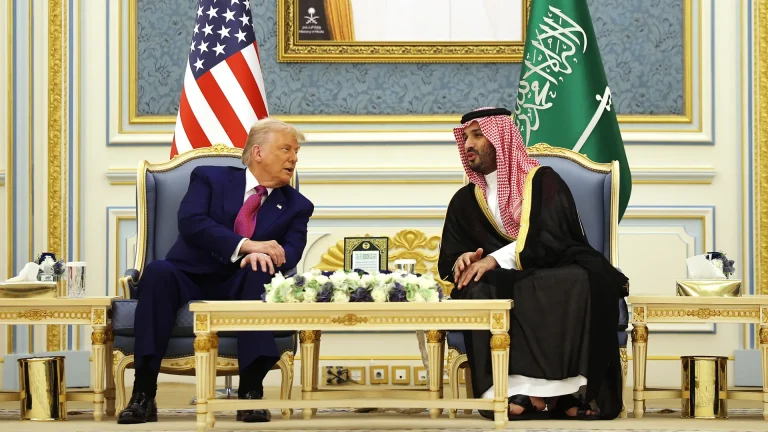The leaders of Saudi Arabia, Qatar and the United Arab Emirates all argued against a strike on Iran’s nuclear facilities during President Trump’s recent visit and encouraged him to continue pushing for a new nuclear deal, three sources with knowledge of the talks tell Axios.
Why it matters: Saudi Arabia, the UAE and other Gulf states opposed a nuclear deal in 2015. Now they’re among the most enthusiastic supporters of diplomacy.
Flashback: At the time, the Saudis and Emiratis quietly backed Israeli Prime Minister Benjamin Netanyahu’s public fight against then-President Obama on the Iran deal and his threats to attack Iran.
- Now, they’re worried Netanyahu will pull the trigger, or that Trump will give up on talks and opt for a military option himself.
Behind the scenes: Saudi Crown Prince Mohammed bin Salman, UAE President Mohammed bin Zayed and Qatari Emir Tamim al-Thani all told Trump they worry that if Iran’s nuclear sites are attacked, their countries will be targeted for Iranian retaliation. All three host U.S. military bases.
- A source with direct knowledge said al-Thani told Trump the Gulf states will be affected more than anybody else in such a scenario.
- The Saudis and Qataris expressed concerns specifically about an Israeli military strike on Iran. The UAE also said it would prefer a diplomatic solution.
- All three leaders expressed support for Trump’s negotiations, U.S. officials say. Saudi, Qatari and Emirati officials declined to comment.
State of play: Trump confirmed Wednesday that he cautioned Netanyahu during a call last Thursday against ordering a strike on Iran’s nuclear facilities, as Axios first reported.
- Trump said he believes the Iranian nuclear crisis can be solved with “a very strong document,” which could be signed within the next two weeks.
The intrigue: Trump considered announcing during his trip that the U.S. would start referring to the Persian Gulf as the Arabian Gulf, but said before taking off that he didn’t want “to hurt anybody’s feelings.”
- Ultimately, Trump took a pass. Two Arab officials say the reason was a lack of consensus among the Gulf countries, with some feeling it would create unnecessary tensions with Iran.
The big picture: The Saudis and Emiratis are less concerned about Iran’s regional activity than they were during Obama’s 2015 talks, which they opposed in part because they were not consulted in advance. Their priority now is to maintain regional stability and focus on economic growth.
- Saudi Arabia has been gradually normalizing relations with Iran over the last two years. The UAE has also been reengaging Iran to reduce tensions.
- An unusual visit to Tehran last month by Saudi Defense Minister Khalid bin Salman to Tehran, during which he met Supreme Leader Ali Khamenei, was meant to signal that the kingdom opposes a military strike against Iran’s nuclear program, a former U.S. official said.



